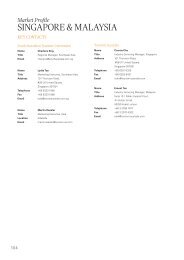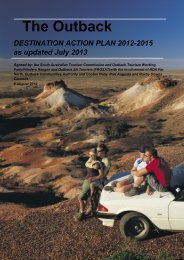Flinders Ranges and Outback Integrated Strategic Tourism Plan
Flinders Ranges and Outback Integrated Strategic Tourism Plan
Flinders Ranges and Outback Integrated Strategic Tourism Plan
You also want an ePaper? Increase the reach of your titles
YUMPU automatically turns print PDFs into web optimized ePapers that Google loves.
Final <strong>Plan</strong><br />
A Governance Model for Driving <strong>and</strong> Resourcing the Implementation of the <strong>Plan</strong><br />
13.0 A GOVERNANCE MODEL FOR DRIVING AND RESOURCING THE<br />
IMPLEMENTATION OF THE PLAN<br />
Figure 6 shows the range of roles associated with the implementation of an integrated<br />
regional tourism strategy.<br />
It is clear that responsibility for a successful tourism industry does not rest with any single<br />
organisation. A number of State Government departments, regional organisations, Councils<br />
<strong>and</strong> private sector organisations need to be involved. It is, however, critical that they work<br />
together towards the same overall vision or else there will be gaps, inconsistencies <strong>and</strong><br />
overlaps in their endeavours.<br />
13.1 Why Governments Have a Role in <strong>Tourism</strong><br />
There needs to be a compelling reason for proposing that Governments intervene in a<br />
private industry sector. All spheres of Government are required to justify the level of their<br />
investment in initiatives that will provide a direct benefit to commercial enterprise.<br />
In respect to tourism, there are several reasons why Governments – National, State <strong>and</strong><br />
Local, choose to invest in measures that support increased visitation <strong>and</strong> expenditure from<br />
tourism.<br />
Firstly, tourism provides direct <strong>and</strong> indirect economic benefits through the level of<br />
expenditure <strong>and</strong> the number of jobs created in the country, state, region or local area.<br />
Secondly, individual tourism operations, many of whom are small businesses <strong>and</strong> often<br />
owner operated, will rarely have the resources to provide information about <strong>and</strong> support to<br />
the promotion of other businesses in the region, even when this can be clearly demonstrated<br />
to be of mutual benefit.<br />
Similarly, multiple players in a small business environment are not well placed to commission<br />
<strong>and</strong> manage the kind of collaborative market research required to assist them to effectively<br />
target new <strong>and</strong> emerging markets or to reposition their product to increase the yield from<br />
existing markets.<br />
For this reason, Government intervention in tourism, research planning, marketing, promotion<br />
<strong>and</strong> visitor information is essential.<br />
Councils will provide the most effective support to their local tourism operators <strong>and</strong> the best<br />
outcomes for other businesses by contributing to region-wide marketing, information,<br />
planning, research <strong>and</strong> product development initiatives.<br />
Much of the area that comprises the <strong>Flinders</strong> <strong>Ranges</strong> <strong>and</strong> <strong>Outback</strong> SA is not covered by<br />
Local Government. The <strong>Outback</strong> Areas Community Development Trust (OACDT) will need to<br />
work with the SATC, DTEI <strong>and</strong> NRDB <strong>and</strong> other Government bodies to support local tourism.<br />
Urban & Regional <strong>Plan</strong>ning Solutions<br />
d:\frosa region istp\frosa region istp.doc Page 82





